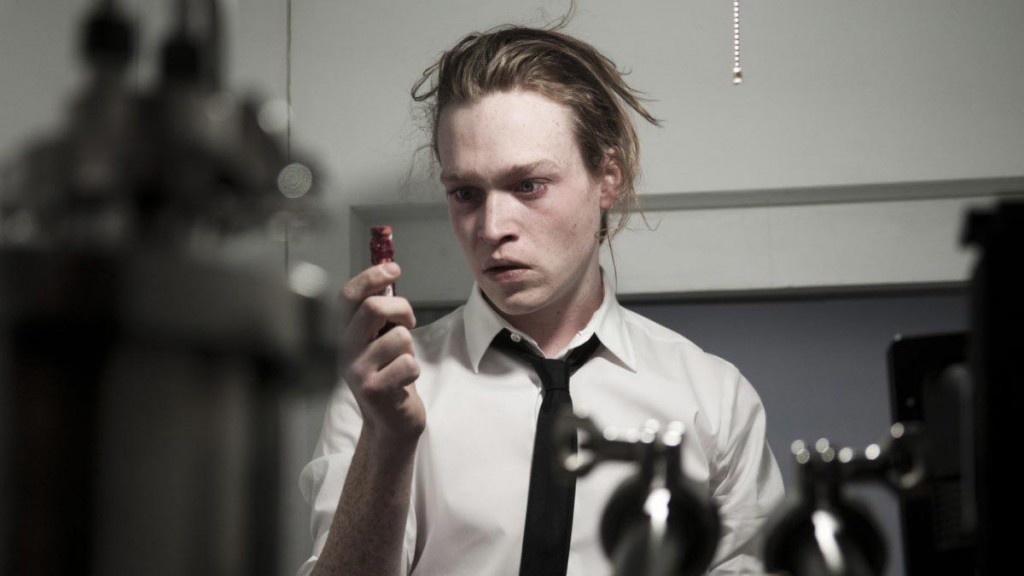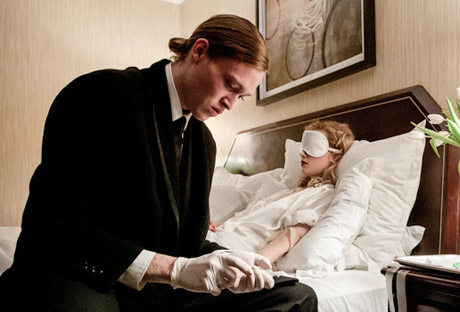It’s a bit puzzling why Brandon Cronenberg would choose to make a film based on the horrors of the human body for his debut effort. It’s a genre that his father, David Cronenberg, isn’t just known for – it’s a genre he practically invented, and certainly defined. Refer to a horror film as “Cronenbergian,” and any self-respecting genre fan has a good idea what to expect – you’re going to get a film that delves into grotesque permutations of the human body with a focused eye on philosophical and scientific theory, and it’s going to be oozey and graphic and (hopefully) fascinating. Making a film that can be easily described as “Cronenbergian” doesn’t so much invite comparison to his father’s work as it does openly embrace it, and while the elder Cronenberg is certainly one of the best genre filmmakers in the world to want to emulate, it’s a bit like if Duncan Jones had chosen to make a glam rock album instead of directing MOON — the legacy is so powerful that any attempt to work in the same field is going to be rife with association.
And good Lord, does ANTIVIRAL have a Cronenbergian plot. In a sterile, white-drenched world, diseases are harvested from celebrities and then replicated in order to be sold to their fans for them to feel as though they have a genuine piece of the person they admire. The film’s protagonist, Syd, works at the Lucas Clinic, one of the major corporations that deal in fame-based viral transfers, and attempts to make extra money by smuggling a new disease that’s infected Hannah Geist, the agency’s hottest celebrity carrier, to a black market organization through a local shop that sells replicated muscle cells of celebrities sliced to resemble meat. Things go bad, however, when Syd begins experiencing symptoms of Geist’s disease, and threaten to take down the whole house of cards the industry has built.

It’s a premise that essentially screams “Cronenbergian” from the top of its lungs, one filled with possibility for exploration into melding celebrity worship and corporate espionage with truly disturbing horrors of bodily mutation. To his credit, Brandon Cronenberg delves into the premise with great gusto, building a fully-conceived film that manages to sell the premise to the hilt, and including enough tiny details (the media coverage of celebrities is always vague about what they actually do, but their omnipresence in this world is a thing a perfection) to bring the world the ideas create to life. It’s a vivid and visceral film, one that doesn’t flinch away from multiple needle injections or graphic mutilations, yet still carefully framing each moment with such precision that you can’t help but admire the artistry of the camera’s eye.
Unfortunately, admiration is about as far as you get while viewing ANTIVIRAL as an audience member. For as intricate as the plotting and how well-crafted every shot in the film are, ANTIVIRAL almost completely lacks any sense of humanity. As Syd, Caleb Landry Jones is a compelling-looking figure, an androgynous, gangly waif with a grizzled voice that comes off as Tilda Swinton playing Michael Rooker, and he turns in a fine performance, but the film gives him no real character to play. We’re never given any sense of Syd as a person – he’s just a drone going through the motions and becoming slowly intertwined with the black market virus smuggling for reasons not completely clear. He seems to have no family, no friends, and no sense of humor or identity.

While most David Cronenberg movies are thought of as “cold,” none of his works lack humanity – the likes of VIDEODROME, EXISTENZ, THE FLY and THEY CAME FROM WITHIN are about human beings dealing with the scientific and cultural theories the plot foists upon them. Sure, James Woods’s Max Renn in VIDEODROME is a jackass, but he’s a very human one with a sense of humor you can understand even if you can’t fully relate to. The ideas in the elder Cronenberg’s films are always disassembled and absorbed (often literally) through the eyes of the characters themselves, rather than having the characters feeling like test subjects in some sort of grand experiment as to “what if this were to happen?” All of the characters in ANTIVIRAL seem like guinea pigs being set loose in a meticulously-created maze of horrors, rather than human beings we can identify with as an audience.
As clever as ANTIVIRAL is, it lacks a sense of humor as well – the only moments that come close to levity are a few offhanded conversations between some of Syd’s co-workers. The dark humor implicit in the more satirical concepts of the plot would have been enough had the characters involved in the situations had more of a sense of reality to them, but everyone involved is just as cold, isolated and unidentifiable as the world they inhabit.

This isn’t to say that ANTIVIRAL is a “bad” film. It’s conceptually inventive, frequently fascinating and beautifully shot by cinematographer Karim Hussain. The problem is that it’s the cinematic equivalent of a museum piece – amazing to look at and exquisitely polished, but ultimately untouchable and completely unrelatable. Brandon Cronenberg has proven himself to be a talented filmmaker aesthetically, but one hopes that his follow-up will treat his characters a bit more like human beings and less like the meat they’re sold as in ANTIVIRAL’s world.
– Paul Freitag-Fey
- [THE BIG QUESTION] WHAT’S YOUR FAVORITE FEMALE ENSEMBLE IN MOVIES? - July 22, 2016
- [IN THEATERS NOW] THE BOY (2016) - January 24, 2016
- Cult Movie Mania Releases Lucio Fulci Limited Edition VHS Sets - January 5, 2016






No Comments